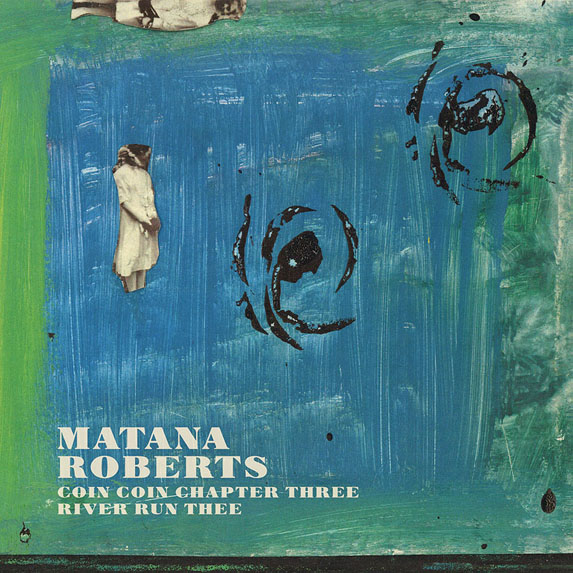The immensity with which this album struck me can only be compared to the way I felt on first being exposed to Captain Beefheart’s ‘Troustmaskreplica’, David Sylvian’s ‘Manafon’, Scott Walker’s ‘The Drift’, or ‘Monoliths & Dimensions’ by Sunn O. Not that I want to mislead the reader by namedropping a bunch of other, heavy, recondite album in the first sentence of this review – make no mistake – river run thee is a completely unique album, the likes of which I have never heard before on record, but only in dreams, fevers, hallucinations, visions, and meditations
. I write to you as a man returning from a strange, unmapped land, struggling to use an ill-suited vocabulary to express all that I have heard and seen, when all that I have experienced before bears little relation to it. So please tolerate the feeble ravings of this febrile frontiersman, and allow me to give you a little background information before I show you the slides.
River run thee is the third instalment in the twelve-part narrative Coin Coin conceptualized and performed by alto saxophonist and composer Matana Roberts. It’s a little hard to define to newcomers the full scope of a project as ambitious and deep as this one – especially as it is still, and may ever be, in progress – but Coin Coin is, to quote Matana herself, “a multimedia project about my love of history,” drawing on aspects of folklore, ancestry, The African American experience in America, and, ultimately, the human experience. To achieve this, Matana has been utilizing a process she calls ‘Panoramic Sound Quilting’; a self-made notation system still in development that employs visual collages and art (in lieu of the standard notation system) to structure composition and improvisation. The term ‘Quilting’ is apt, as river run thee is not an album in the commonly understood sense as being an assemblage of songs, but a complete sonic mosaic that has been patchworked into existence, woven together by abstract strands of Effects Pedals, drones, feedback loops, processed saxophone, recitative poetry, melancholic songs plucked crippled from the past, indistinct chorals of coven-like voices, and field recordings.
In keeping with the first two chapters of Coin Coin – Gens de Couleur Libres and Mississippi Moonchile – there is no separation between the tracks on river run thee; it all blends together as seamless whole, and is, in essence, one big composition, and should be listened to as such. But there its relation to its forbears ends. While the first two chapters were suite-like in nature, comprised of live Jazz ensembles intermingling Free Music with spirituals and sung, spoken, and sometimes screamed history, river run thee is a complete solo effort, and is nothing less than the musicalization of one woman’s consciousness, and all of the ancestry contained therein.
To me, there is nothing quite so thrilling; in its purity, it is nothing less than Sound Art. Right from the beginning, it is clear that this is an album from which you cannot detach yourself. It not only demands your full involvement and commitment, but exacts it from you without your even being aware of it. Mid-way way through the album, Matana’s incantatory voice repeatedly invites you to “come away with me”, but it is clear that this is just a formality: in reality, there is no choice. Putting on this album is like being given an anaesthetic prefatory to surgery – once you slide those earphones over your ears, it is clear that you won’t be coming back for a while, seduced by the dissonant choirs of phantasmagoric voices that I can’t promise you aren’t casting spells on the listener to conjure them into obedience. Indeed, whilst listening to the album, I couldn’t shake the feeling that I was a semi-living ghoulish soul being floated down The River Styx, or that I was a corpse being disinterred from the grave, with groups of magi around me chanting, bringing me back to life for their own nefarious purposes. I know that may sound morbid, but river run thee is not an album of the living – it is an arrhythmic voyage into the unconscious mind, where deep, strange histories lay lurking within us all, blended into dreams; filtered by darkness.
Why should you listen to river run thee? It is not an easy listen. It offers none of the solace people usually expect from an album, there are no hooks, no beats, no choruses here. I could tell you it’s one of the greatest albums I’ve ever heard, but what would that mean to you? I think I’ll turn to Matana for the answer: In the opening section of the album, ‘all is written’, Matana sings a haunting, sea-shanty like melody in which she repeatedly poses the refrain “Why do we try so hard?” After mulling this question over for the duration of the song, she comes to a stoical conclusion that summarizes the complete joy of perseverance that is the human spirit: “Because we should.”
River run thee is set to be released by Constellation on February 2nd. Until then, it can listened to in full on The Guardian website.

